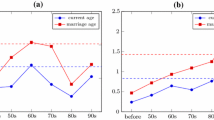Abstract
The theory of Markov decision processes (MDP) can be used to analyze a wide variety of stopping time problems in economics. In this paper, the nature of such problems is discussed and then the underlying theory is applied to the question of arranged marriages. We construct a stylized model of arranged marriages and, inter alia, it is shown that a decision maker's optimal policy depends only on the nature of the current marriage proposal, independent of whether there is recall (storage) of previous marriage proposals.
Similar content being viewed by others
REFERENCES
Arrow, K.J., and Fisher, A.C. (1974), Environmental preservation, uncertainty, and irreversibility, Quarterly Journal of Economics, 88: 312–319.
Auboyer, J. (1965), Daily Life in Ancient India. New York: Macmillan.
Batabyal, A.A. (1997), The impact of information on land development: A dynamic and stochastic analysis, Journal of Environmental Management 50: 187–192.
Becker, G.S. (1973), A theory of marriage: Part I, Journal of Political Economy 81: 813–846.
Becker, G.S. (1991), A Treatise on the Family, enlarged edn. Cambridge, MA: Harvard University Press.
Capozza, D.R., and Helsley, R.W. (1990), The stochastic city, Journal of Urban Economics 28: 187–203.
Clarke, H.R., and Reed, W.J. (1990), Land development and wilderness conservation policies under uncertainty: A synthesis, Natural Resource Modeling 4: 11–37.
Derman, C. (1970), Finite State Markovian Decision Processes: New York and London, UK: Academic Press.
Dixit, A.K. and Pindyck, R.S. (1994), Investment Under Uncertainty. Princeton, NJ: Princeton University Press.
Goode, W.J. (1963), World Revolution and Family Patterns. New York, Free Press.
Henry, C. (1974), Option values in the economics of irreplaceable assets, Review of Economic Studies 41: 89–104.
Mandelbaum, D.G. (1970), Society in India. Berkeley, CA: University of California Press.
McDonald, R., and Siegel, D. (1986), The value of waiting to invest, Quarterly Journal of Economics, 101: 707–728.
Moore, M. (1994), Changing India, wedded to tradition: Arranged marriages persist with 90s twists, The Washington Post, 8 October.
Otani, K. (1991), Distributions in the process to marriage and pregnancy in Japan, Population Studies 45: 473–487.
Pindyck, R.S. (1991), Irreversibility, uncertainty, and investment, Journal of Economic Literature 29: 1110–1152.
Rao, V.V.P. and Rao, V.N. (1982), Marriage, the Family and Women in India. New Delhi, India: South Asia Books.
Ross, S.M. (1970), Applied Probability Models with Optimization Applications. San Francisco, CA: Holden-Day.
Ross, S.M. (1974), Dynamic programming and gambling models, Advances in Applied Probability 6: 593–606.
Stone, L.D. (1975), Theory of Optimal Search. New York and London, UK: Academic Press.
Swanson, T.M. (1995), The international regulation of biodiversity decline: optimal policy and evolutionary product, in C. Perrings, K-G. Maler, C. Folke, C.S., Holling and B-O. Jansson, (eds.), Biodiversity Loss: Economic and Ecological Issues. Cambridge, UK: Cambridge University Press.
Wolff, R.W. (1989), Stochastic Modeling and the Theory of Queues. Englewood Cliffs, NJ: Prentice-Hall.
Author information
Authors and Affiliations
Rights and permissions
About this article
Cite this article
Batabyal, A.a. Aspects of Arranged Marriages and the Theory of Markov Decision Processes. Theory and Decision 45, 241–253 (1998). https://doi.org/10.1023/A:1004998730922
Issue Date:
DOI: https://doi.org/10.1023/A:1004998730922




